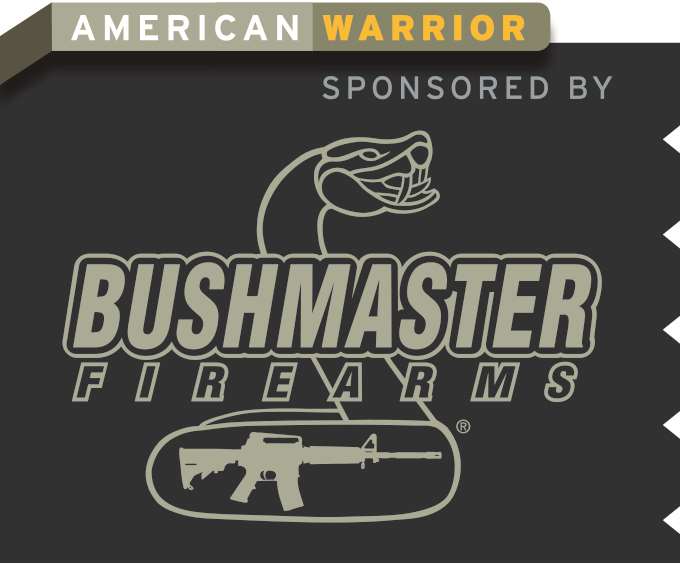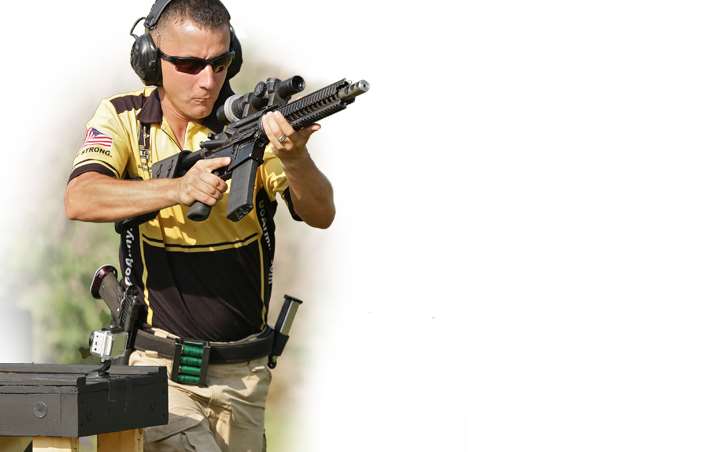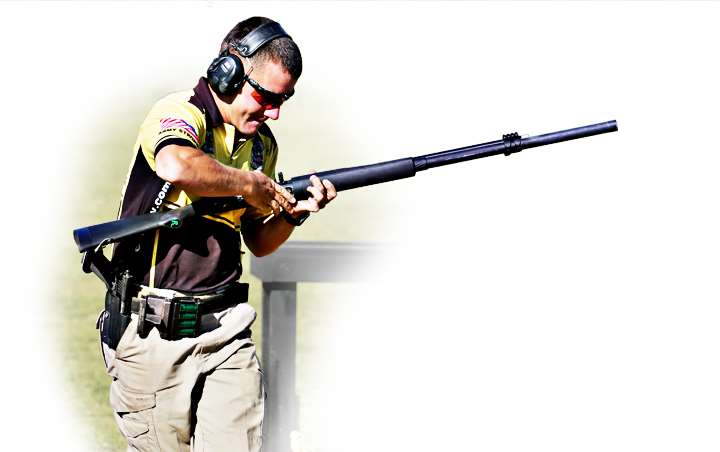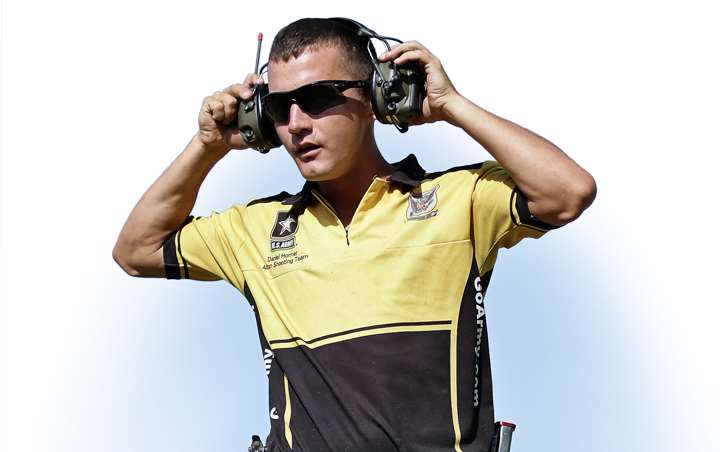
To say that U.S. Army Staff Sgt. Daniel Horner is a good shot is kind of like saying Kevin Durant is a good basketball player—it's true, but a gross understatement of the highest order. In the short history of the 3-gun nation professional tour, nobody has dominated like Horner, who has won seven of the last eight regular season matches against the best 3-gun shooters in the world.
In fact, the first time I met Horner, a fellow 3-gun competitor introduced him as "Daniel the Great"—no small compliment coming from someone who competes against him month in and month out.
A member of the U.S. Army Marksmanship Unit, Horner, 27, started shooting IDPA (International Defensive Pistol Association) matches with his dad when he was 12 years old. And despite being a competitive soccer player, he spent enough time at the range to quickly excel at shooting, winning a national IDPA title at 16.
His introduction to 3-gun came at age 15 at a match in North Carolina with lots of big-name shooters.
“It was a big 3-gun match for the time,” Horner recalled. “I’d never really done it before, so I just kind of went out there and used the same mentality I had with pistol shooting. It was a really physical match. Being younger, and I had played soccer most of my life, I was in pretty good shape for that kind of match. I think I ended up ninth.”
That might have been the very last time Horner finished that low in a 3-gun competition. He’s become a daunting force in the shooting sport he has adopted as his favorite, finding so many things to like about 3-gun that he can’t narrow down a favorite—or even two or three.
“I like the people,” he said. “I like the competition. I like the challenges. I like the pace. It is for sure more aggressive.
“I like the gear challenges, too. I like trying to come up with something new—something to make the guns perform better.”
While in high school and still trying to determine what to do next with his life, Horner received an opportunity he couldn’t pass up. And it was an opportunity he has made the most of.
“I was offered a chance to come down and try out for two weeks on the Army action shooting team,” he said. “I’d always been interested in joining the Army. In fact, I was actually considering trying to get into West Point. The interview and tryouts went well, and I was offered the job. I went to basic training, infantry school and right onto the team.”
The rest, as they say, is history for this young soldier, who has quickly risen to the top of his sport. And while there are several aspects to being a winner in any sport, Horner, with his soccer background, sees physical fitness as a top priority.
“Fitness is very important in 3-gun,” he said. “It’s not only important in shooting the stages, but being in good physical condition to be ready all day long, and prepared to shoot the match well, is one of my advantages.”
How important is the mental aspect in winning at the highest level? Horner believes it can’t be overrated.
“For probably the top 10 guys, it is 90 percent mental and 10 percent physical,” he said. “Everyone is pretty much capable of doing the same stuff. It’s just who can control their mind and make the shots when it really matters.”
Part of that mental aspect, Horner said, is never having even a single doubt about who will be at the top of the leader board at the end of the day.
“If you are going to win, you have to expect to win when you show up,” he said. “With the level everyone is at now, if you show up with even a little bit of doubt in your mind, there’s no way that you have a chance. Any of those guys in the top 20 or so are definitely showing up expecting to the win. They work pretty hard at it.”“Everyone is pretty much capable of doing the same stuff. It’s just who can control their mind and make the shots when it really matters.”
Adding to the physical and mental aspects, Horner said, is a large dose of competitiveness—absolutely necessary for any sport, including competitive shooting. And Horner is as fierce a competitor as you’ll find anywhere.
“I’ve always been a very, very competitive person,” he said. “That’s why I enjoy shooting so much. And it has definitely given me an edge.
“The competition is what I enjoy. And being extremely competitive is definitely one of the things I attribute my success to. I was competitive growing up, no matter what I was doing.” The team aspect—training with other great shooters—also has greatly attributed to Horner’s success at the shooting sports, including 3-gun.
In fact, four of his Army teammates are currently ranked in the top 15 in the 3-Gun Nation Pro Series: Shane Coley, fourth; Matthew Sweeney, sixth; Tyler Payne, seventh; and Joel Turner Jr., 14th.
“Having teammates that are great shooters is a huge help,” he said. “It gives me an opportunity to bounce ideas off guys I can trust, and come up with better tips and techniques for engaging targets. Or if a gun breaks, we can figure out the problem together.
“It is pretty competitive among us, too, but all good-natured competition. Nobody ever gets upset. Everybody wants to do their best, and wants their buddy to do their best.”
In fact, the same can be said for the other competitors on the 3-Gun Nation Pro Series, who share a bond beyond just competition. When asked whether the other competitors fear him, Horner can only laugh and say “not likely.”
“I just go out there and shoot,” he said. “They are all my good friends. We all give each other a hard time, but it’s in good fun. Everybody takes it seriously, but nobody takes the competition over the friendships.
“As soon as you stop doing stuff for fun, it can start getting kind of obnoxious.”
Others on the pro tour, who shoot against Horner on a regular basis, echo Horner’s comments about camaraderie. They find themselves finishing behind him nearly every time out, and could very easily decide they don’t like the guy.
“To be honest, you’d like to hate a guy that goes out and beats you every time,” said one Top-20 competitor, who will remain anonymous. “But that’s impossible. He’s just too good a guy not to like him. Just a really, really good guy.”
These days, Horner spends more time training others and traveling than actually practicing his shooting. That makes improvement much more difficult, at a time when he sees the competition on the tour ratcheting up a notch or two.
“The competition keeps betting a lot better,” he said. “I think you’ll see a huge increase in skill level pretty soon, just because everyone is going to keep on looking at different ways of doing things—looking at different styles of shooting. Everybody’s performance will take another step up.
“I know I have a lot of room for improvement. If I could spend a week straight just shooting, it would help me a lot—probably 5 percent at least.”
Being dominant in the sport, however, leaves Horner little time to rest on his laurels or pause to count his championships and earnings.
“It’s great being at the top of the leader board,” Horner said. “It’s a lot of hard work and a lot of pressure. But it’s worth it to try to win.
“I’m under pressure to win every time I compete. I guess it’s kind of self-imposed pressure. But you don’t want to climb and climb and climb, then fall down.”
While you might think traveling the country with his teammates kicking butt in competitions would be Horner’s favorite part of his job, you’d be wrong. His unit also has the opportunity to train soldiers before they are deployed overseas, helping them hone skills that will make them better able to do their duty in battle—and maybe even keep them alive.
“Really the very best thing about being on the team is getting to train the soldiers,” he said. “We try really hard to take all the skills we need in competition and relate them to the skills you need for combat. We teach quite a few classes through the year—usually carbine, pistol and sniper rifle stuff—to try to help these guys out before they go overseas.
“The best compliment I ever got was from a guy who made a shot overseas and later told me that one of the drills we did in training was exactly the scenario he was put into there. He ended up making the shot.”
Horner, like many relative youngsters, isn’t sure what his long-term future will hold. What he does know for sure is that he loves what he’s doing right now.
“I obviously enjoy what I do, and I like the camaraderie of the team,” he said. “It’s a great job, and a great group of guys to work with.”
Drill, Baby, Drill
Any interview with a champion shooter would be remiss without asking about favorite drills. That question was an easy one for Horner.
“One of my favorite drills is 20-alpha,” he said. “Address a 20-yard target with your pistol. Draw and shoot five rounds, four times, trying to keep them all in the alpha. Then do the same thing with the rifle from about 40 yards, working on both speed and accuracy.
“You’re trying to push your speed to where you’re only dropping one or two Charlies (C-zone hits). This lets you know exactly where your limit is.”


































